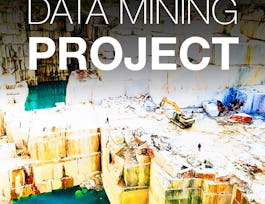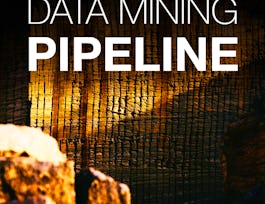This course covers the core techniques used in data mining, including frequent pattern analysis, classification, clustering, outlier analysis, as well as mining complex data and research frontiers in the data mining field.


Data Mining Methods
This course is part of Data Mining Foundations and Practice Specialization
Taught in English
Some content may not be translated

Instructor: Qin (Christine) Lv
4,914 already enrolled
Included with 
Course
(18 reviews)
Recommended experience
What you'll learn
Identify the core functionalities of data modeling in the data mining pipeline
Apply techniques that can be used to accomplish the core functionalities of data modeling and explain how they work.
Evaluate data modeling techniques, determine which is most suitable for a particular task, and identify potential improvements.
Details to know

Add to your LinkedIn profile
Course
(18 reviews)
Recommended experience
See how employees at top companies are mastering in-demand skills

Build your subject-matter expertise
- Learn new concepts from industry experts
- Gain a foundational understanding of a subject or tool
- Develop job-relevant skills with hands-on projects
- Earn a shareable career certificate


Earn a career certificate
Add this credential to your LinkedIn profile, resume, or CV
Share it on social media and in your performance review

There are 4 modules in this course
This week starts with an overview of this course, Data Mining Methods, then focuses on frequent pattern analysis, including the Apriori algorithm and FP-growth algorithm for frequent itemset mining, as well as association rules and correlation analysis.
What's included
15 videos3 readings1 programming assignment1 discussion prompt
This week introduces supervised learning, classification, prediction, and covers several core classification methods including decision tree induction, Bayesian classification, support vector machines, neural networks, and ensemble methods. It also discusses classification model evaluation and comparison.
What's included
9 videos1 programming assignment
This week introduces you to unsupervised learning, clustering, and covers several core clustering methods including partitioning, hierarchical, grid-based, density-based, and probabilistic clustering. Advanced topics for high-dimensional clustering, bi-clustering, graph clustering, and constraint-based clustering are also discussed.
What's included
8 videos1 reading1 programming assignment
This week discusses three different types of outliers (global, contextual, and collective) and how different methods may be used to identify and analyze such outliers. It also covers some advanced methods for mining complex data, as well as the research frontiers of the data mining field.
What's included
8 videos1 peer review
Instructor

Offered by
Recommended if you're interested in Data Analysis

University of Colorado Boulder

University of Illinois at Urbana-Champaign

University of Colorado Boulder

University of Colorado Boulder
Get a head start on your degree
This course is part of the following degree programs offered by University of Colorado Boulder. If you are admitted and enroll, your coursework can count toward your degree learning and your progress can transfer with you.
Why people choose Coursera for their career




New to Data Analysis? Start here.

Open new doors with Coursera Plus
Unlimited access to 7,000+ world-class courses, hands-on projects, and job-ready certificate programs - all included in your subscription
Advance your career with an online degree
Earn a degree from world-class universities - 100% online
Join over 3,400 global companies that choose Coursera for Business
Upskill your employees to excel in the digital economy
Frequently asked questions
A cross-listed course is offered under two or more CU Boulder degree programs on Coursera. For example, Dynamic Programming, Greedy Algorithms is offered as both CSCA 5414 for the MS-CS and DTSA 5503 for the MS-DS.
· You may not earn credit for more than one version of a cross-listed course.
· You can identify cross-listed courses by checking your program’s student handbook.
· Your transcript will be affected. Cross-listed courses are considered equivalent when evaluating graduation requirements. However, we encourage you to take your program's versions of cross-listed courses (when available) to ensure your CU transcript reflects the substantial amount of coursework you are completing directly in your home department. Any courses you complete from another program will appear on your CU transcript with that program’s course prefix (e.g., DTSA vs. CSCA).
· Programs may have different minimum grade requirements for admission and graduation. For example, the MS-DS requires a C or better on all courses for graduation (and a 3.0 pathway GPA for admission), whereas the MS-CS requires a B or better on all breadth courses and a C or better on all elective courses for graduation (and a B or better on each pathway course for admission). All programs require students to maintain a 3.0 cumulative GPA for admission and graduation.
Yes. Cross-listed courses are considered equivalent when evaluating graduation requirements. You can identify cross-listed courses by checking your program’s student handbook.
You may upgrade and pay tuition during any open enrollment period to earn graduate-level CU Boulder credit for << this course/ courses in this specialization>>. Because << this course is / these courses are >> cross listed in both the MS in Computer Science and the MS in Data Science programs, you will need to determine which program you would like to earn the credit from before you upgrade.
MS in Data Science (MS-DS) Credit: To upgrade to the for-credit data science (DTSA) version of << this course / these courses >>, use the MS-DS enrollment form. See How It Works.
MS in Computer Science (MS-CS) Credit: To upgrade to the for-credit computer science (CSCA) version of << this course / these courses >>, use the MS-CS enrollment form. See How It Works.
If you are unsure of which program is the best fit for you, review the MS-CS and MS-DS program websites, and then contact datascience@colorado.edu or mscscoursera-info@colorado.edu if you still have questions.

